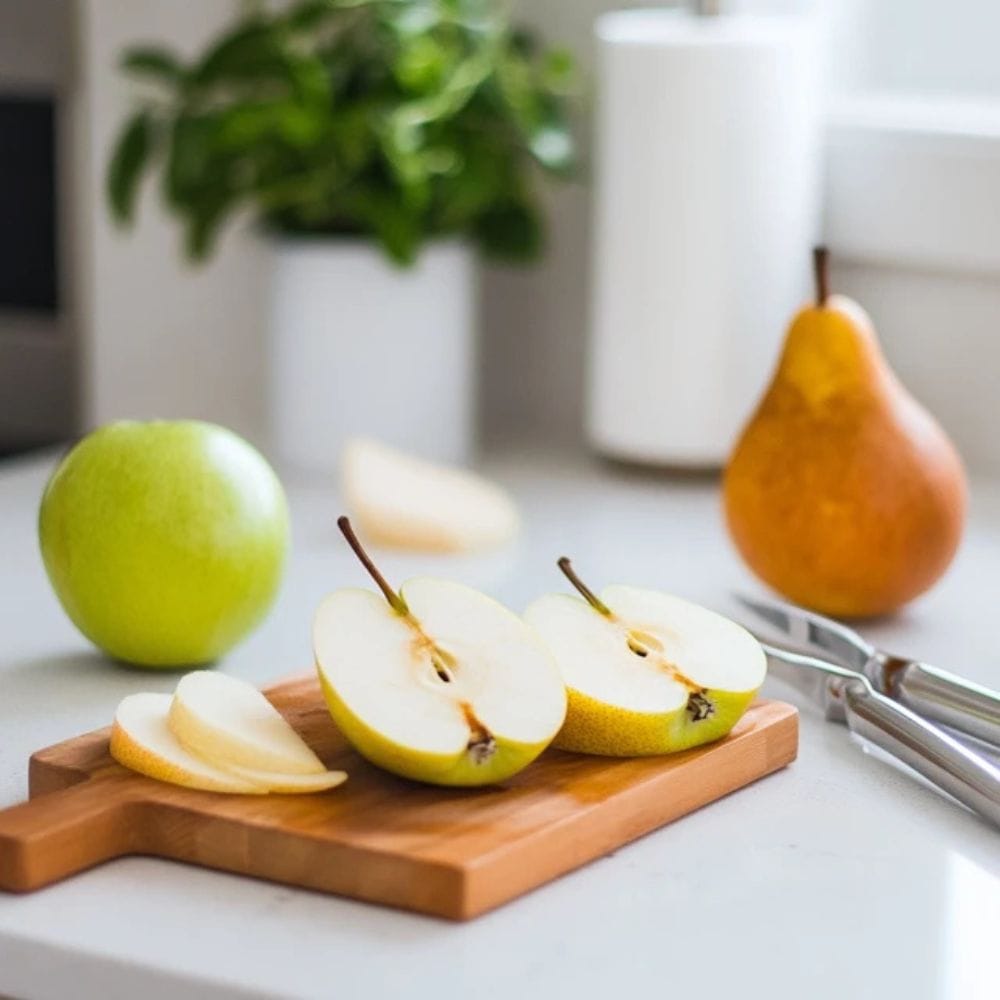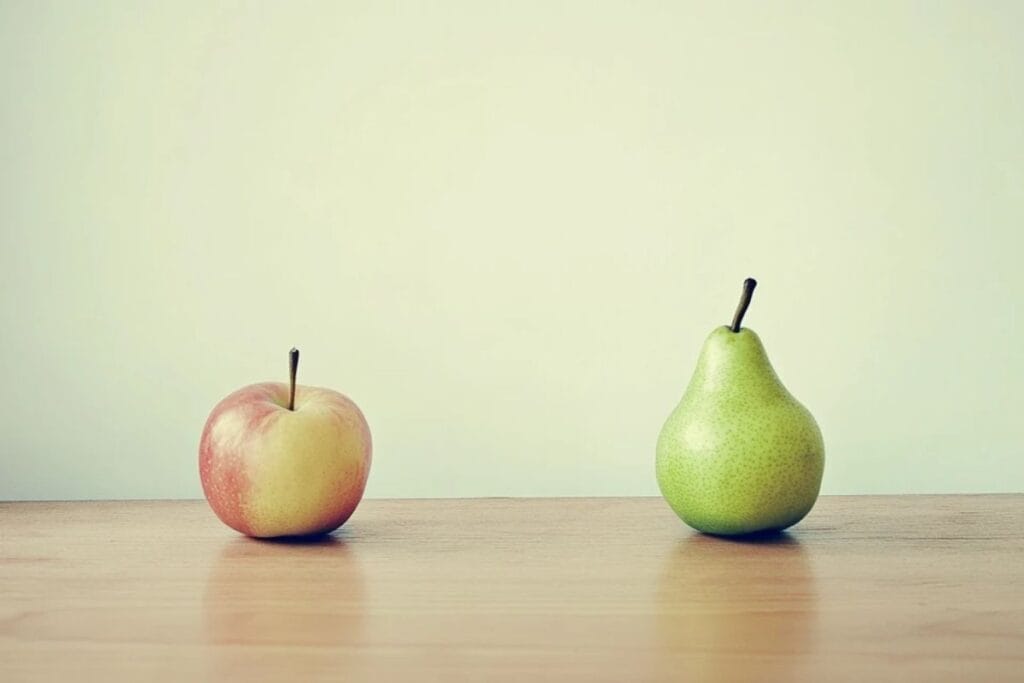The question “What is healthier: a pear or apple?” often sparks curiosity among health-conscious individuals. Both fruits are popular and boast unique nutritional benefits. Including them in your diet contributes to better health, but comparing their nutritional profiles helps understand their distinct advantages. Whether you’re looking at dietary fiber, vitamins, or calorie content, each fruit shines in its own way.
Nutritional Profiles of Pears and Apples

Macronutrient Comparison
When comparing apples and pears, macronutrients form the foundation of their benefits. Pears contain approximately 57 calories per 100 grams, while apples are slightly lower at 52 calories. Pears tend to have more carbohydrates, primarily in the form of natural sugars, which contribute to their sweeter taste. Both fruits are low in fats and protein, making them ideal snacks for those aiming to manage their calorie intake.
For individuals focusing on weight management, apples might seem the better choice due to their slightly lower calorie count. However, the carbohydrate content in pears, coupled with their fiber density, often promotes a more prolonged feeling of fullness.
| Nutrient | Apple (per 100g) | Pear (per 100g) |
|---|---|---|
| Calories | 52 | 57 |
| Carbohydrates | 14g | 15g |
| Protein | 0.3g | 0.4g |
| Fats | 0.2g | 0.1g |
What is healthier: a pear or apple based on vitamins and minerals?
In terms of vitamins, pears stand out for their Vitamin K and copper content. These nutrients play crucial roles in bone health and cellular repair. Apples, on the other hand, are an excellent source of Vitamin C, which boosts immunity and supports collagen production.
Mineral content also varies. Pears excel in providing small but essential amounts of copper and magnesium, both critical for metabolic and neurological functions. Apples bring a solid dose of potassium to the table, helping regulate blood pressure.
Dietary Fiber Content in Apples and Pears
Fiber is a highlight for both apples and pears. Pears generally contain around 3.1 grams of fiber per 100 grams, whereas apples offer approximately 2.4 grams. The difference might seem minimal, but the type of fiber matters too. Pears are rich in soluble fiber, particularly pectin, which improves digestion and helps regulate cholesterol levels. Apples provide a blend of soluble and insoluble fiber, aiding digestion and enhancing stool regularity.
Discover fruits with more fiber than an apple.
Antioxidant Properties
What is healthier: a pear or apple in terms of antioxidants?
Antioxidants are vital for combating oxidative stress, which contributes to aging and chronic diseases. Apples are rich in quercetin, a flavonoid known for its anti-inflammatory and anti-cancer properties. This compound is primarily found in the apple’s skin, emphasizing the importance of eating apples unpeeled.
Antioxidants Found in Pears
Pears provide their share of antioxidants, including phenolic acids and flavonoids. These compounds help reduce inflammation and protect cells from damage caused by free radicals. Although pears may not be as famous as apples in the antioxidant department, their subtle yet significant contribution shouldn’t be overlooked.
Health Benefits of Apples
What is healthier: a pear or apple for cardiovascular health?
Apples support heart health by reducing risk factors like high cholesterol. Studies suggest that the soluble fiber in apples binds to cholesterol in the digestive system, reducing its absorption. They also contain polyphenols, which are compounds that lower blood pressure and improve arterial flexibility. Read more about the benefits of apples.
Weight Management
For those focused on maintaining or losing weight, apples are an excellent choice. Their low-calorie content and high water composition help promote satiety. Pairing them with protein-rich foods, like nuts, enhances their effectiveness as a satisfying snack.
By focusing on these essential details, it’s clear that both pears and apples offer unique advantages. Their nutritional profiles complement each other, making them excellent additions to a balanced diet.
Health Benefits of Pears

Digestive Health
Pears are often considered a powerhouse for digestive health. Their high fiber content—particularly soluble fiber—promotes smoother digestion and alleviates constipation. Moreover, pears contain compounds like sorbitol and fructose, natural sugars that have a mild laxative effect. These qualities make pears an excellent choice for individuals with sensitive stomachs or chronic digestive issues.
For comparison, apples offer a blend of soluble and insoluble fibers, but they don’t match pears in terms of fiber density. This makes pears slightly superior when it comes to improving gut health. Explore the health benefits of pears for more details on their digestive properties.
Pears are not only delicious but also highly versatile, making them a popular choice for various culinary uses. For example, their high fiber content makes them a natural remedy for digestion-related issues, as explored in is pear juice good for the bowels. Moreover, their natural sweetness and nutrient density make pears a star ingredient in recipes designed for health enthusiasts, as highlighted in pear juice health recipes. If you’re looking to understand how pears contribute to weight management, don’t miss the details provided in do pears burn belly fat. Including pears in your meals can help you enjoy their nutritional benefits while diversifying your diet.
| Digestive Benefits | Pear | Apple |
|---|---|---|
| Fiber Type | Rich in soluble fiber | Blend of soluble and insoluble fibers |
| Digestive Impact | Mild laxative effect, eases constipation | Supports stool regularity |
What is healthier: a pear or apple for anti-inflammatory effects?
Both apples and pears provide anti-inflammatory benefits, but pears have an edge due to their phenolic compounds. These antioxidants not only reduce inflammation but also improve the body’s resistance to oxidative stress. Chronic inflammation often underpins conditions like arthritis and heart disease, and pears offer a natural way to mitigate these risks.
Apples, while also anti-inflammatory, derive their benefits primarily from flavonoids like quercetin. Incorporating both fruits into your diet ensures you receive a diverse range of anti-inflammatory nutrients.
Immune System Support
Pears are excellent for boosting immunity, thanks to their Vitamin C and antioxidant content. These nutrients strengthen the body’s defenses against infections and illnesses. Additionally, pears contain copper, a trace mineral essential for maintaining a healthy immune response.
On the other hand, apples provide similar immune benefits but focus more on Vitamin C and polyphenols. While the differences are subtle, pears may be slightly more beneficial for overall immunity due to their copper content.
Potential Risks and Considerations
Allergies and Sensitivities
Although both fruits are generally safe, some people may experience allergies or sensitivities. Apple allergies, often linked to birch pollen, can cause oral itching or swelling. Pears, particularly raw ones, might trigger reactions in individuals sensitive to stone fruits like peaches.
To minimize risks, peeling the fruit can sometimes help, as allergens often reside in the skin. For those unsure about their sensitivities, cooking or baking apples and pears reduces allergenic potential.
What is healthier: a pear or apple regarding pesticide residue concerns?
Both fruits are listed among the “Dirty Dozen,” a group of produce items with higher pesticide residue levels. Washing thoroughly under running water or using a fruit-specific wash helps reduce these residues. Choosing organic varieties can also lower exposure to pesticides, especially for families with young children.
| Risk Factor | Pears | Apples |
|---|---|---|
| Common Allergens | Potential in stone fruit-sensitive people | Linked to birch pollen sensitivity |
| Pesticide Residue Concerns | Often found, especially in non-organic pears | High, particularly in conventionally grown apples |
Incorporating Pears and Apples into Your Diet
What is healthier: a pear or apple as a healthy snack?
Both fruits are incredibly versatile as snacks. Pears, with their soft and juicy texture, are ideal for those looking for a naturally sweet and easy-to-eat option. Apples, with their crunchiness, are perfect for pairing with nut butter or yogurt for added protein and satiety.
Whether diced in salads, blended in smoothies, or enjoyed raw, both fruits cater to different preferences and dietary needs. For an energy boost, pair apples with almonds or use pears in a fruit salad sprinkled with chia seeds.
Cooking and Baking Applications
In the kitchen, apples and pears prove their versatility time and again. Apples excel in baked goods, such as pies and crisps, due to their firmness and ability to hold shape during cooking. Pears, on the other hand, shine in poached desserts or savory dishes paired with blue cheese or prosciutto.
Both fruits can also be transformed into sauces, jams, or chutneys, making them valuable pantry staples. For example, apple compote works well as a pancake topping, while caramelized pears elevate any breakfast dish.
By exploring their culinary uses and addressing potential risks, it’s evident that apples and pears each have unique qualities. Their benefits extend beyond health, enriching daily meals with flavor and variety.
Environmental and Economic Factors
What is healthier: a pear or apple in terms of seasonal availability?
Seasonal availability significantly impacts the quality and cost of fruits like pears and apples. Apples are typically harvested in the fall, with some varieties available year-round due to cold storage techniques. Pears also peak in the fall but have a shorter storage life, which can make them less accessible during certain months.
Choosing fruits in season ensures better flavor, texture, and nutritional value. While apples are more widely available throughout the year, pears shine during their peak season, offering maximum sweetness and juiciness. By understanding the seasonality of these fruits, consumers can make more informed choices for their meals.
| Seasonal Factor | Apples | Pears |
|---|---|---|
| Peak Season | Fall; available year-round | Fall; limited availability in winter |
| Storage Life | Long (due to refrigeration) | Shorter; prone to quick ripening |
Cost Considerations
The cost of pears and apples varies depending on seasonality, location, and farming practices. Apples tend to be more budget-friendly, as their extended storage life reduces transportation and production costs. Pears, with their delicate skin and shorter shelf life, often come with a slightly higher price tag, especially out of season.
However, purchasing locally grown fruits during their respective harvest times can help lower costs. Farmers’ markets often provide fresh, high-quality pears and apples at competitive prices, making them an excellent option for consumers looking to save while supporting local agriculture.
FAQs
Which fruit has more fiber, a pear or an apple?
Pears generally contain more fiber than apples, especially soluble fiber, which aids digestion and heart health.
Are there significant differences in vitamin content between apples and pears?
Both fruits offer a variety of vitamins. Apples are richer in Vitamin C, while pears provide more Vitamin K and copper.
Can eating apples or pears aid in weight loss?
Yes, both fruits are low in calories and high in fiber, promoting satiety and supporting weight management goals.
Do apples and pears have different effects on blood sugar levels?
Both fruits have low glycemic indices, making them suitable for maintaining stable blood sugar levels.
What is healthier: a pear or apple for kids?
Both fruits are excellent choices. However, pears are softer and easier to chew, making them a better option for toddlers.
Final Thoughts
The debate over “What is healthier: a pear or apple?” ultimately boils down to individual preferences and nutritional goals. Apples offer a crisp texture and a wide variety of flavors, making them a favorite for heart health and weight management. Pears, with their juicy sweetness and high fiber content, excel in promoting digestion and reducing inflammation.
Including both fruits in your diet ensures a balanced intake of essential nutrients and antioxidants. Whether you snack on a raw apple or savor a poached pear, these fruits enrich your meals and support a healthier lifestyle. Make the most of their unique benefits by incorporating them into diverse recipes and enjoying their seasonal freshness.






